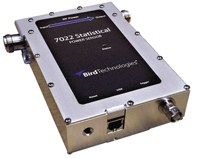Bird Technologies, a leading provider of RF components, subsystems, test equipment, and services, introduced the model 7022 statistical RF power sensor, the only thruline RF power measurement device that provides the statistical analysis capability required to accurately characterize the RF power characteristics of any digitally-modulated signal employed in wireless communications systems.
Bird's model 7022 measures power levels from 250 mW to 500 W over a frequency range of 350 MHz to 6 GHz and is an excellent choice for applications ranging from performance optimization to maintenance and troubleshooting. It is extremely compact, lightweight, and rugged, measuring only 5.8" x 4.8" x 1.3" and weighing 1.5 lb., making it well suited for use in the field. In addition to measuring the statistical properties of digital waveforms it provides a complete range of other RF measurements including forward and reflected average power, VSWR, and return loss.
The model 7022 includes the latest version of Bird’s VPM3 Windows-based Virtual Power Meter software that when installed on a Windows-based laptop, tablet, or desktop computer provides a comprehensive user interface for configuring measurements, viewing results, and exporting data for trend analysis in spreadsheets.
Why Statistical Analysis?
The non-periodic time-domain characteristics of digitally-modulated signals make it impossible to accurately characterize them using conventional RF power measurement techniques. Benchtop instruments with statistical measurement capability have been available for some time, but the Bird Model 7022 is the first to incorporate them in a thruline USB-connected power sensor suitable for use in any environment from periodic field measurements to installation in base stations.
The Bird model 7022 has three operating modes. In “conventional” mode it functions much like a traditional RF power sensor, measuring forward and reflected average power, VSWR, and return loss. In “time-domain” mode it displays time-domain waveform characteristics and provides markers to determine average burst power, peak power, and other pulse-related parameters. In “statistical” mode it measures peak-to-average power ratio versus the time in percent that the waveform is at or exceeds a specific peak/average power ratio.
The model 7022 statistical RF power sensor is supplied with Bird’s VPM3 virtual power meter software. It is priced at $4,495, is available now, and can be ordered from Bird or Bird distributors. More information can be obtained at www.birdrf.com.
